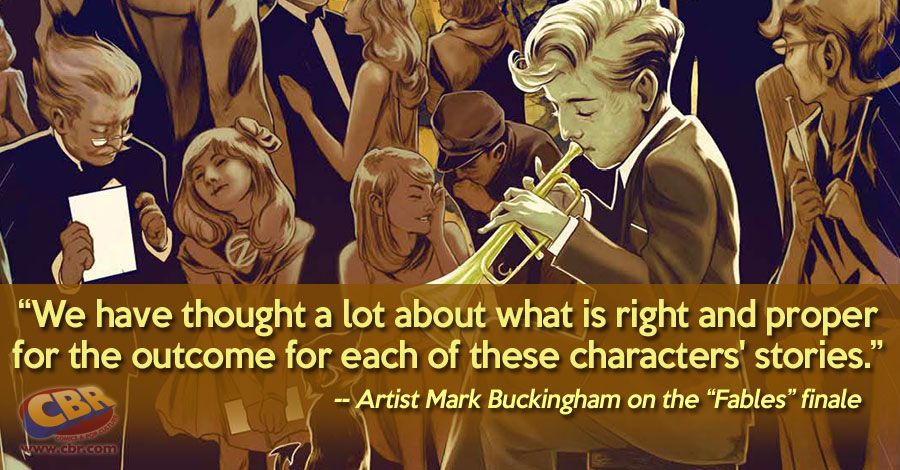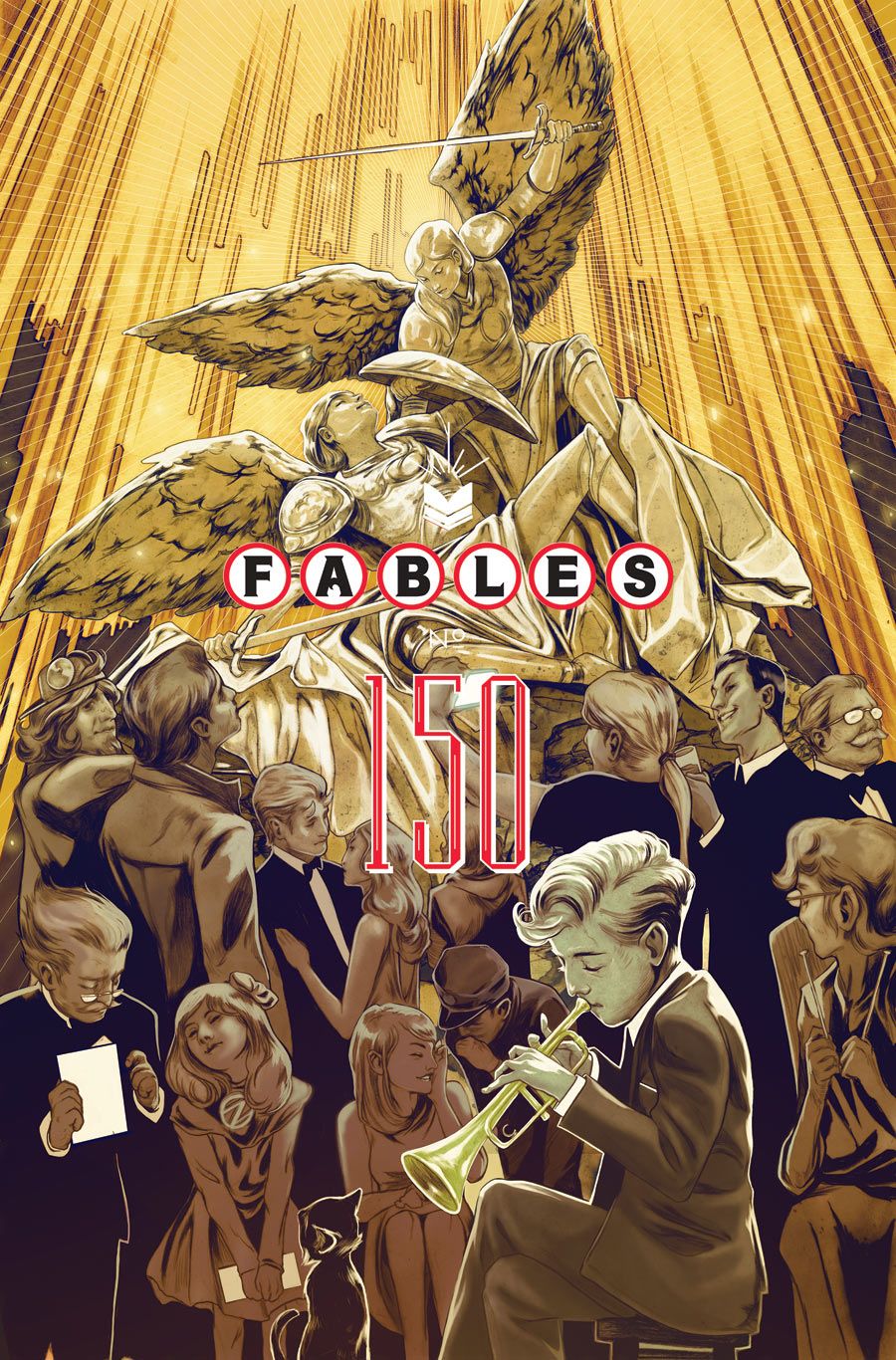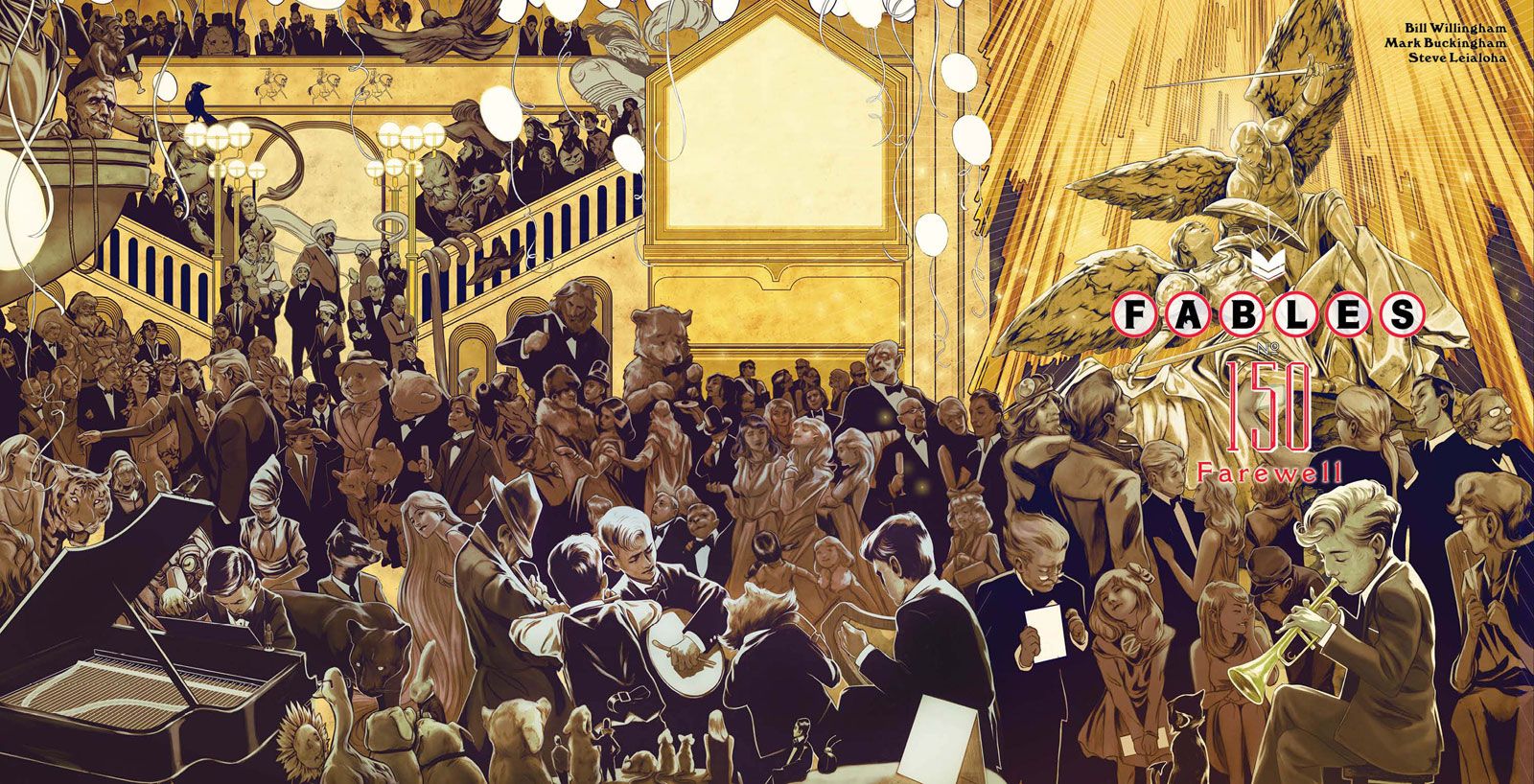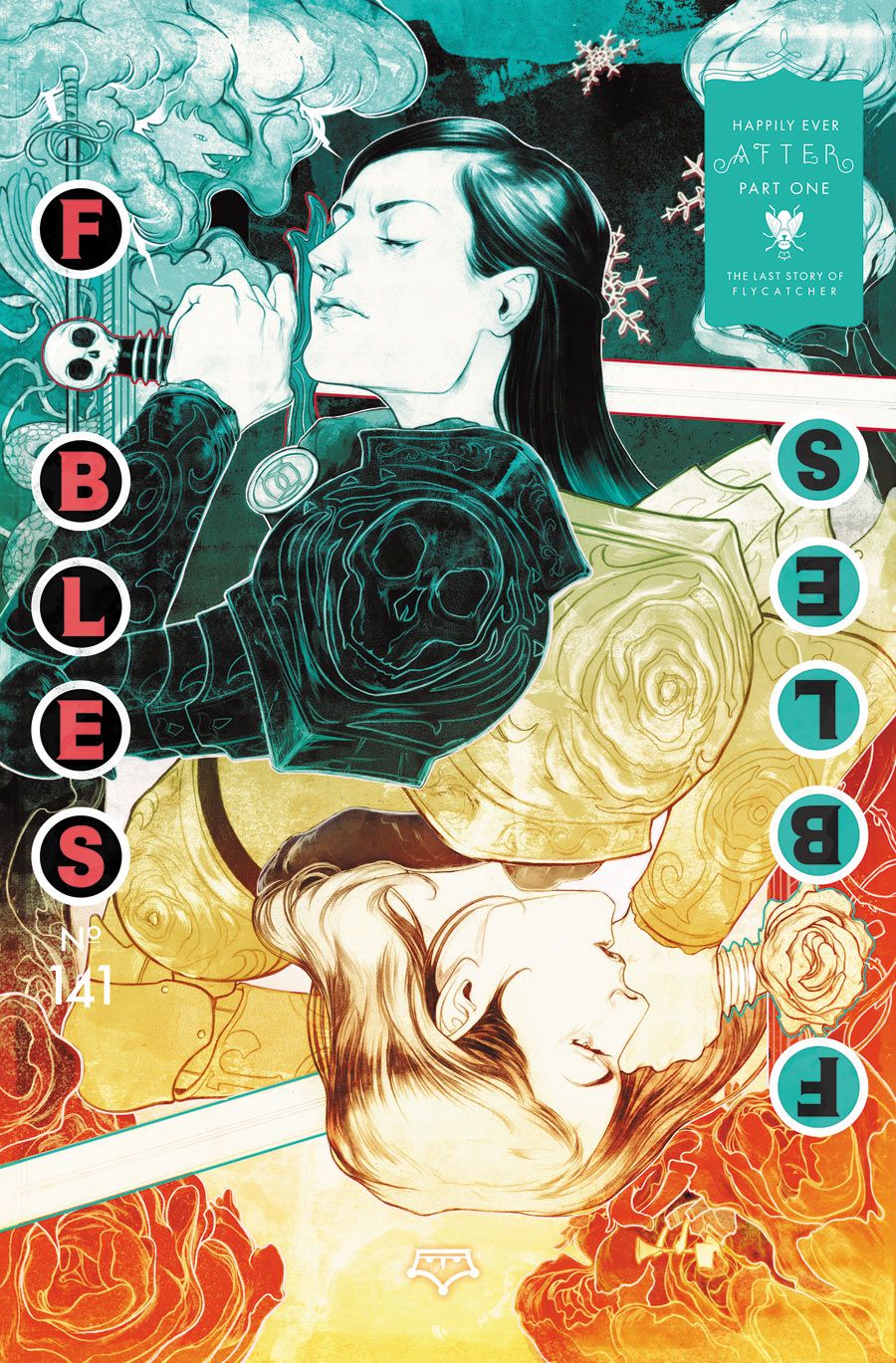SPOILER WARNING: This article contains major spoilers for "Fables" #150, which is available now.
With 14 Eisner Awards under its belt since its debut in 2002, "Fables" can confidently be considered one of the best comic book titles of the past decade and a half.
Created by Bill Willingham for DC Comics' Vertigo imprint, the series has featured multiple artists over the past 13 years, but artist Mark Buckingham has delivered a lion's share of the interior art, having penciled 109 issues, including "Fables" #150 -- the final installment of the series, which arrived in stores this week.
CBR News connected with Willingham and Buckingham in celebration of the landmark final issue, and the all-star creative team shared valuable insight into the key players of "Fables," including Bigby Wolf, Snow White and her sister -- and adversary -- Rose Red. Willingham and Buckingham also revealed how much the New York Times bestselling series has changed their lives and discussed why it was important to unleash the Big Bad Wolf on the citizens of Fabletown before "Fables" came to an end.
While both writer and artist also told CBR News that a return to "Fables" is not 100% out of the question, the need to take a "nice long nap" was absolutely necessary. Willingham also stated that he wouldn't even consider more "Fables" unless Buckingham was willing and able to return, as well.
Bill Willingham: Jeffrey, how many times have we spoken about "Fables"?
CBR News: I would guess 15-20 times.
Willingham: How can you possibly have any questions left?
I don't. I just wanted to say thank-you for an epic run. That's it. See you later.
Willingham: Thanks. Nice talking to you. [Laughs]
Mark Buckingham: You can talk to me... [Laughs]
[Laughs] Okay, Mark. How has "Fables" changed your life?
Willingham: That's actually a good question.
Buckingham: Quite dramatically, really. For starters, it made me popular enough that international conventions invited me to attend, which meant that I met my now-wife Irma, so I think "pretty significantly" is the answer to that question.
Creatively, "Fables" game me something that I'd been missing for a long time, which was a book that I absolutely and totally adored and felt completely in tune with. And a creative team around me that was the most amazing and supportive bunch that you could probably ask for. It gave me an environment in which I could hone my craft and flourish and take pleasure in every working day. That's what "Fables" gave me more than anything else: a wonderful place to be.
Willingham: I am going to go with Mark's answer word for word, except for the situation where I could meet my wife, Irma. [Laughs] That's the one significant difference. As a matter of fact, I've yet to meet Irma and I still think that she's an actor Mark has hired to play his wife from time to time. [Laughs]
But honestly, I was at a down turn in my life before "Fables." I couldn't afford a car. I couldn't afford to eat often. And that's changed, obviously. I don't want to be crass and say cashing in was important, but "Fables" made its place in the industry and I don't feel the pressure anymore that I had to accomplish something with my life. Now, it's just a matter of what's left after such a glorious run.
It's worth noting in the career lifetime of Mark and me the industry has changed to where the idea that you actually keep books in print [exists]. That was brand new to comics within in our lifetime. If there is any immortality to be had in the world, and I don't actually believe in life after death and all of that stuff, it will be these stories. Before, when we first got started, we couldn't even count on the stories being left behind because they were just disposable literature. You print them once, and then they're tossed out and you go on to the next thing. The idea of reprints or keeping these things in print was an alien concept for much of our careers.
Something that Mark pointed out to me, for those of you that were trade readers and those of you who got individual issues, "Fables" #150 comes to both of you at the same time for a nice finale.
Over the past decade, if I were explaining "Fables" to a non-comic book reader, I would start by saying that it's about the Big Bad Wolf, but now he's the good guy. And then I would tell them that he's married to Snow White and it's their story. But as we came to the end of "Fables" and I re-read the first few trades, I see that I've been dead wrong. It's always really been about Snow White and her sister Rose Red. It's a story of two sisters. Am I right?
Willingham: Yes and no. It was Bigby's story in the sense that there were two bedrock anchor stories in "Fables." One was the romance between Snow and Bigby, in which Bigby was, of course, a very important part. And the other was the relationship between the two sisters. We stumbled into, or maybe it was by design -- readers can take their pick -- but Bigby and Snow finally overcame all of their problems and they ended up in a pretty stable marriage. We resolved that story about halfway through the series. That left the other big one, the unresolved one, which was the relationship between the two sisters.
Of course, even though the final issue does feature Bigby in a pretty big and dramatic way, he is not the main character. It's Snow and Rose and that had to be intentional because that's the really big outstanding story that had to be addressed.
There is a great line in "Fables" #146 that reads: "It's not about who is the hero and the villain anymore. Not at this level." As I was reading the final issues of "Fables," I actually started to think that you were going to make Bigby the bad guy. Did you ever consider making him the bad guy of "Fables"?
And if not, could "Fables" have worked with Bigby being the bad guy?
Buckingham: In a way, Bigby started out in the series as a bad guy but his fascination with Snow is what triggered the turning point. He wanted to protect her. And he accepted the things that were offered to him in order for him to become the champion of Fabletown. I think there was always that sense in the back of everyone's mind, that he was a monster. And that monster hasn't gone away. It was just being channeled for good. There was always that sense, that if he ever lost that humanity that he had adopted, there was always a danger that the monster would return. We have had various flashback stories that have given us indications of what happened to him in the past. In his origin story, there is a darker side to his character. But the monster was always there, potentially. There was always a chance that he could fall.
Willingham: We had to show it at least once before we bid goodbye to all of them. [Laughs] Mark has it right. At his core, Bigby is a monster. The civilized Bigby is a shell around him, the purpose of which is to keep the monster from getting out. But sometimes, shells break.
Literally, in this case, because those issues where Bigby was on loose were some of the scariest moments of "Fables."
Willingham: Well, thank you. Or, we apologize -- whichever is appropriate.
Buckingham: Again, I think it was necessary for us to show that although he has been the protector of Fabletown, he could potentially be its greatest threat. We needed to show you some of that reality in the last couple of years of the book.
Bill, we've talked about Ambrose Wolf in the past, and you channeling that character in particular when writing him in "Fables." Was that you or Ambrose that visited Rose Red in the encampment the night before the final battle?
Willingham: [Laughs] I know to whom you speak. [Pauses] I will say this: Rose Red has an encounter in her encampment the evening before the final battle, and I think that we are not going to say whom the encounter is with. Unless you get Mark drunk again, I think that's going with us to the grave. You're right. It's a very important encounter but is it me? No. It's not me.
Mark, is there a character that you've connected with the most. And don't say Bigby. I know you too well, and there is no monster in there.
Buckingham: [Laughs] No, you're right. For me, it's King Ambrose, the Flycatcher. The first time that I questioned something that Bill was going to do in the book was when he was originally supposed to die back in the "March of the Wooden Soldiers" arc. I said, "No, no, no. He's my favorite character. There is a lot that we can do with him." That decision set us on an exploration of the history of that character, and his whole story arc developed as a response to that. He always was my favorite because he was the one true innocent of everyone in the Fables community. He's the one that managed to escape and come to a new land without having to take a darker path. Terrible things happened to him, but he always hung on to his own sense of right and good. And no blood was spilled by his hand. That was something that I could really identify with. He has such a good heart. In many ways, he is someone that I would want to be.
Willingham: Mark would be too honest to point out that there are pretty interesting parallels between Mark and Ambrose/Flycatcher. Mark was well known as an artist before "Fables," but not widely known. As a matter of fact, he was the subject of one of my favorite "Comics Journal" stories from way back when, which was "The Greatest Artist that Nobody Knows." Maybe not as dramatic a move from janitor to great and terrible king of new and wonderful kingdom, but there is a similar rise. I am being arrogant in saying that he came into his own in a big way in the industry in "Fables," but he's not unlike Ambrose, who has created this really terrific kingdom for the Fables to live in, and he has all of these terrific powers and doesn't abuse them. I think that's a good description of Mark.
Buckingham: Thank-you. But I am having trouble growing the magic forest. [Laughs] And my carving skills are not that great, so I don't think that there will be a wooden Bucky army anytime soon. But thank you, Bill. That's very sweet of you to say.
People love debating the endings of hit television series and whether or not the creators delivered a proper sendoff. Did you stick the landing on "Fables"?
Buckingham: I hope so. The problem is, whenever you invest a lot of yourself in a series, when you read and love a particular set of characters, it's always going to be difficult watching their story come to an end. Obviously, a lot of people wish that it wasn't ending. And maybe in that regard they will be a little disappointed.
I think we've tried to, as much as possible, give all of the characters the ending that they should have received. I think we have thought a lot about what is right and proper for the outcome for each of these characters' stories.
Willingham: And some characters come to an end that I wouldn't characterize as something that they would want! [Laughs] But each of them received an ending that was appropriate to that character. Maybe not "deserved," but you can see that each ending is the clear result of the life they lived. At least, that's what we tried to do.
"Fables" #150 by Bill Willingham and Mark Buckingham is available now.




